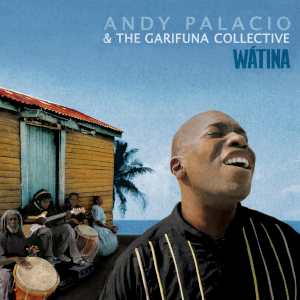Andy Palacio and the Garifuna Collective (Belize)
Wátina (2007)
12 tracks, 50 minutes
Bandcamp ∙ Spotify ∙ iTunes
The first time I heard Wátina was also the first time I heard the music of the Garifuna. And my brain couldn’t process it. What was this?! It sounded distinctly African, but in a way that I couldn’t place – I couldn’t work out the musical geography of it at all. There are Latin inflections to it and it’s quite bluesy in its own way…and I didn’t recognise the sounds or the rhythms and cadences of the language that was being sung at all.
Well, that’s because while this music may be African, it’s not from Africa. The Garifuna people of Central America and the Caribbean have their origins in 1635. Two ships full of enslaved people from West Africa sank off the island of St Vincent. About half of the Africans managed to survive and make their way ashore, where they lived with and became part of the native Carib people. The Garifuna culture remains a syncretic mix of native and West African cultures with further influences from colonising European powers. So, their religion takes shamanic elements of the Caribs together with elements of West African vodou, cloaked in Roman Catholic imagery; their language is derived from Carib and Arawak with idiosyncrasies evident from African languages and loanwords from French, Spanish and English creoles. And then you have the music…
Andy Palacio had already been a star of punta music (a Belizian pop style that mixes Garifuna music with rock, reggae and other Caribbean music with the help of loads of synthesisers and drum machines) since the 1980s, but Wátina was the result of a decade of work and research into the roots music of the Garifuna people. Although Palacio himself was from Belize, for this album he worked with Garifuna musicians from all across Honduras and Nicaragua as well, and of all generations, including the old master Paul Nabor. Every song on the album is sung in Garifuna and the ensemble is packed with traditional drums and rattles that outline the unique Garifuna rhythms for shimmering guitars, the occasional ultra-tight sax-and-clarinet section and, of course, Palacio’s irresistible, soulful voice; the music is infectiously danceable but the melodies are strangely sad.
The whole decade’s work really paid off. With the wealth of talent in front of the mics as well as behind the desk (the sound solidified by renowned Belizian producer Ivan Durán), Palacio and crew created an album that awoke the world not only to this wonderful music but to the Garifuna people in general. It’s just the right balance of incredibly rootsy folk with just slight touches here and there to make it relevant to today’s ears. The effect of the album was immediate: it became a hit in world music circles around the world, and quickly saw Palacio honoured as a UNESCO ‘artist for peace’ and a recipient of the WOMEX Award, both in the same year that the album came out.
Unfortunately, Palacio didn’t get to experience the legacy of this album – he died suddenly less than a year after its release. Whether he knew it or not, though, with Wátina, he’d created a real impact that continues to be felt today. Garifuna musicians are a regular fixture in the world music scene, the band he put together are still touring the world, and the songs he wrote have even captured the imagination in other contexts: I even heard calypso legend Calypso Rose singing ‘Wátina’ at this year’s WOMAD. This album is a wonderful artefact, a perfect encapsulation of the Garifuna people in sound: unmistakably African, undeniably indigenous American, at once completely immersed in the roots while being thoroughly modern. What a legacy to leave behind.

No comments:
Post a Comment